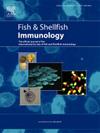Exhaustive stress causes a rapid immunological response in the humoral and cellular haemolymph compartments of the pale octopus (Octopus pallidus)
IF 4.1
2区 农林科学
Q1 FISHERIES
引用次数: 0
Abstract
Cephalopods are economically and ecologically important species across the world, yet information linking physiological stress and associated immunological responses is limited in the current literature. Here, the effects of exhaustive exercise in a holobenthic octopus species, Octopus pallidus, were examined by evaluating immunological parameters. In whole haemolymph, the pH and refractive index were measured. To assess the cellular function of the haemolymph, the total count, cell vitality and phagocytosis capacity of the haemocytes were also measured. To assess enzymatic function, activities of the phenoloxidase system and lysozyme were quantified in the plasma and cellular components of the haemolymph. Overall, exhaustive exercise led to rapid changes in the haemolymph with a significant decrease in the pH and phagocytosis capacity though the number of cells and cell vitality were not affected. Exercise also triggered the increase of activated phenoloxidase (PO-like) activity and the decrease of the inactive zymogen prophenoloxidase (ProPO-like), total PO-like and lysozyme activity in plasma and an increase in total PO-like activity in the hemocyte compartment. These responses indicated that a realistic energetic demand had substantial, rapid impact on immune function. These results also provide an important baseline to understand the immune physiology of cephalopods that will further efforts to identify the mechanisms underlying the impacts of stressors.
劳累应激导致苍白章鱼(Octopus pallidus)体液和细胞血淋巴区迅速产生免疫反应。
头足类动物是全球重要的经济和生态物种,但目前文献中有关生理压力和相关免疫反应的信息非常有限。在此,我们通过评估免疫学参数,研究了全底栖章鱼--苍术章鱼--剧烈运动的影响。测量了全血淋巴的 pH 值和折射率。为了评估血淋巴的细胞功能,还测量了血细胞的总计数、细胞活力和吞噬能力。为评估酶功能,对血淋巴中血浆和细胞成分中酚氧化酶系统和溶菌酶的活性进行了量化。总体而言,剧烈运动导致血液淋巴发生快速变化,pH 值和吞噬能力显著下降,但细胞数量和细胞活力未受影响。运动还导致血浆中活化酚氧化酶(类酚氧化酶)活性增加,非活性酶原丙酚氧化酶(类丙酚氧化酶)、总类酚氧化酶和溶菌酶活性降低,血细胞中总类酚氧化酶活性增加。这些反应表明,现实的能量需求会对免疫功能产生巨大而迅速的影响。这些结果也为了解头足类动物的免疫生理学提供了一个重要的基线,有助于进一步确定应激源的影响机制。
本文章由计算机程序翻译,如有差异,请以英文原文为准。
求助全文
约1分钟内获得全文
求助全文
来源期刊

Fish & shellfish immunology
农林科学-海洋与淡水生物学
CiteScore
7.50
自引率
19.10%
发文量
750
审稿时长
68 days
期刊介绍:
Fish and Shellfish Immunology rapidly publishes high-quality, peer-refereed contributions in the expanding fields of fish and shellfish immunology. It presents studies on the basic mechanisms of both the specific and non-specific defense systems, the cells, tissues, and humoral factors involved, their dependence on environmental and intrinsic factors, response to pathogens, response to vaccination, and applied studies on the development of specific vaccines for use in the aquaculture industry.
 求助内容:
求助内容: 应助结果提醒方式:
应助结果提醒方式:


